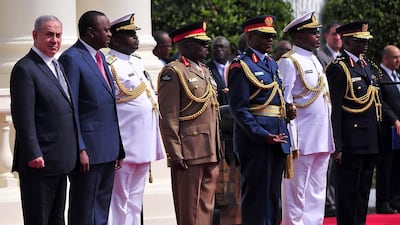JERUSALEM // Escalating violence in South Sudan is casting a light on Israel’s involvement in that conflict and raising questions about prime minister Benjamin Netanyahu’s new strategy of strengthening ties with African countries.
Mr Netanyahu has forged alliances across Africa in an effort, he said, that will help to blunt Palestinian diplomatic initiatives against Israel at the United Nations.
Critics said these new ties — illustrated by Mr Netanyahu’s high-profile visit to several African countries in July — have come without regard for the human rights records of those allies.
Such concerns have been magnified by Israel’s close ties to South Sudan, whose government has used Israeli arms and surveillance equipment to repress its opponents. Critics said Israel’s global arms export policies lack transparency and proper oversight, and ignore the receiving country’s intended use.
“It is the role of the prime minister, the defence minister and the foreign minister to look out for Israel’s interests. But this has a limit: not at any cost and not with everyone,” said Tamar Zandberg, an Israeli opposition politician who has filed a court appeal to halt Israeli sales of sensitive technology to South Sudan.
Israel has long viewed South Sudan as an important ally and a counterweight to Sudan’s support for Palestinian militants.
Israel was one of the first countries to recognise South Sudan’s independence in 2011, and South Sudanese leader Salva Kiir visited Israel months later.
Since South Sudan descended into civil war in 2013, about 50,000 people have been killed and 2 million have been displaced.
In July, hundreds died when fighting broke out in the capital, Juba. South Sudanese troops went on a rampage at a hotel that lasted four hours, killing a journalist while forcing others to watch, raping several foreign women, and looting the compound, witnesses said.
Days earlier, Mr Netanyahu travelled to four African countries — Uganda, Kenya, Rwanda and Ethiopia — in a visit meant to cultivate new allies in his diplomatic battle with the Palestinians. It was the first visit to Sub-Saharan Africa by a sitting Israeli prime minister in nearly three decades.
During the visit, he convened a summit with seven regional leaders, including Mr Kiir — nearly all of whom have been criticised by human rights groups for alleged abuses.
A UN report in January said Israeli surveillance equipment was being used by South Sudanese intelligence, allowing it to intercept communications in “significantly enhanced” monitoring of government opponents.
The report also found that an Israeli automatic rifle, known as the Micro Galil, is “present in larger numbers than before the outbreak of the conflict.”
According to the report, Israel sold the rifles to Uganda in 2007, which transferred the weapons to South Sudan’s national security service in 2014.
According to the report, Israel said it did not receive a request from Uganda for the transfer.
Eitay Mack, an Israeli lawyer working with Ms Zandberg, said weapons export licences require knowledge of end users and mid users — meaning the transfer would either have been done with Israel’s knowledge or would have prompted an investigation into the offending company. He said no investigation was known to have been opened.
The UN report said Israeli ACE rifles were used in a massacre that targeted Nuer citizens in Juba in 2013.
Ms Zandberg said Israel stopped sending firearms to South Sudan in 2013 but that export licences for the surveillance equipment continue. The Israeli defence ministry did not respond to requests for comment.
Israeli foreign ministry spokesman Emmanuel Nahshon said Israel is “extremely satisfied with our renewed relations with many African countries and Israel does not interfere in those countries’ internal affairs”.
The European Union has placed an arms embargo on South Sudan, and following the outbreak of violence, the US imposed sanctions on leading military officials from both sides of the conflict.
In August, the UN Security Council approved an additional regional protection force to enter South Sudan, but decided against an arms embargo on the country.
“Even without an international arms embargo, states should unilaterally suspend arms transfers given the likelihood that arms would be used to commit human rights violations,” said Elizabeth Deng, Amnesty International’s South Sudan researcher.
Ms Zandberg and Mr Mack asked Israel’s supreme court in May to force Israel to explain why it has continued export licences for the surveillance system to South Sudan. The defence ministry asked for a gag order to be imposed on the proceedings.
A hearing was scheduled later this month.
* Associated Press

